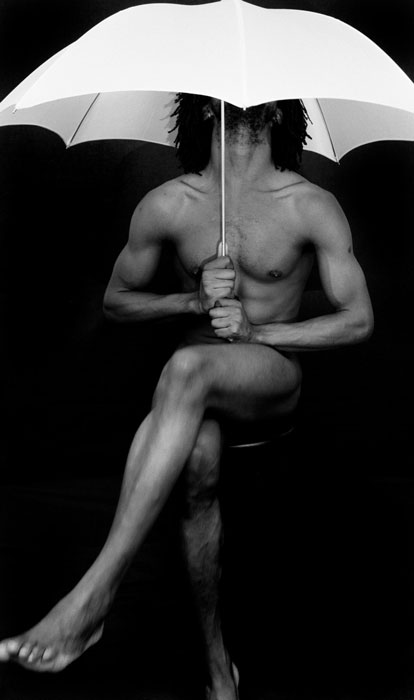Autograph loaned six works by Rotimi Fani-Kayode from our photography collection to the Barbican Centre's major touring exhibition Masculinities: Liberation Through Photography at FOMU, Antwerp.
Through the medium of film and photography, the exhibition considers how masculinity has been coded, performed, and socially constructed from the 1960s to the present day. Examining depictions of masculinity from behind the lens, the exhibition brings together the work of over 50 international artists, photographers and filmmakers including Laurie Anderson, Sunil Gupta, Rotimi Fani-Kayode, Isaac Julien and Catherine Opie. In the wake of #MeToo, the image of masculinity has come into sharper focus, with ideas of toxic and fragile masculinity permeating today’s society.
Curated by Alona Pardo, Masculinities: Liberation Through Photography charts the often complex and sometimes contradictory representations of masculinities, and how they have developed and evolved over time. Touching on themes including power, patriarchy, queer identity, racial politics, female perceptions of men, hypermasculine stereotypes, tenderness and the family, the exhibition examines the critical role photography and film have played in the way masculinities are imagined and understood in contemporary culture.

A founding member and first chairman of Autograph, Fani-Kayode was actively engaged in the Black British art scene during the 1980s.
His photographs have been exhibited internationally since 1985, with numerous solo and group exhibitions in Europe, America and Africa. In 2003, his work featured in the African Pavilion at the 50th Venice Biennale, Italy and today his works are represented in major public and private collectors including Tate, Guggenheim Museum; Victoria & Albert Museum; The Walther Collection; The Hutchins Center; Kiasma-Museum of Contemporary Art; and the collection of Yinka Shonibare CBE, amongst others.
Banner image: Rotimi Fani-Kayode, City Gent, 1988. © Rotimi Fani-Kayode. Courtesy of the artist and Autograph, London.
Page images from top, left to right: 1) Rotimi Fani-Kayode, Untitled, c. 1985. © Rotimi Fani-Kayode. Courtesy of the artist and Autograph, London. 2) Rotimi Fani-Kayode, City Gent, 1988. © Rotimi Fani-Kayode. Courtesy of the artist and Autograph, London. 3) Rotimi Fani-Kayode, Snap Shot, 1987. © Rotimi Fani-Kayode. Courtesy of the artist and Autograph, London. 4) Rotimi Fani-Kayode, Umbrella, 1987. © Rotimi Fani-Kayode. Courtesy of the artist and Autograph, London. 5) Rotimi Fani Kayode, The Black Friar, 1989. © Rotimi Fani-Kayode. Courtesy of the artist and Autograph, London. 6) Cover of book Rotimi Fani-Kayode & Alex Hirst: Photographs.
Autograph is a space to see things differently. Since 1988, we have championed photography that explores issues of race, identity, representation, human rights and social justice, sharing how photographs reflect lived experiences and shape our understanding of ourselves and others.